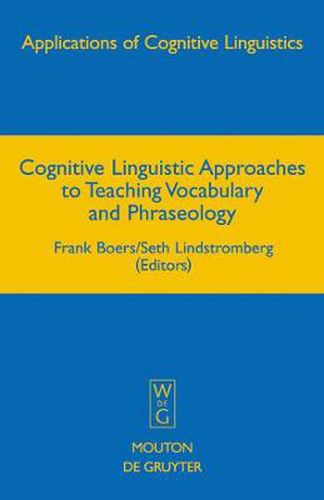Cognitive Linguistic Approaches to Teaching Vocabulary and Phraseology

Cognitive Linguistic Approaches to Teaching Vocabulary and Phraseology
This title is printed to order. This book may have been self-published. If so, we cannot guarantee the quality of the content. In the main most books will have gone through the editing process however some may not. We therefore suggest that you be aware of this before ordering this book. If in doubt check either the author or publisher’s details as we are unable to accept any returns unless they are faulty. Please contact us if you have any questions.
Mastering the vocabulary of a foreign language is one of the most daunting tasks that language learners face. The immensity of the task is underscored by the realisation that it is not only single words but also numerous standardised phrases (idioms, collocations, etc.) that need to be acquired. There is thus a clear need for instructional methods that help learners tackle this task, and yet few proposals for vocabulary instruction have so far gone beyond techniques for rote-learning and familiar means of promoting of noticing. The reason for this is that vocabulary and phraseology have long been assumed arbitrary.
The volumeoffers a long-overdue alternative by exploring and exploiting the presence of linguistic ‘motivation’ - or, systematic non-arbitrariness - in the lexicon. The first half of the volume reports ample empirical evidence of the pedagogical effectiveness of presenting vocabulary to learners as non-arbitrary. The data reported indicate that the proposed instructional methods can benefit when both the nature of the target lexis and the basic cognitive orientations of particular learners are taken into account. The first half of the book mostly targets lexis that has already attracted a fair amount of attention from Cognitive Linguists in the past (e.g. phrasal verbs and figurative idioms). The second half broadens the scope considerably by revealing the non-arbitrariness of diverse other lexical patterns, including collocations and word partnerships generally. This is achieved by recognising some long-neglected dimensions of linguistic motivation - etymological and phonological motivation, in particular. Concrete suggestions are made for putting the non-arbitrary nature of words and phrases to good use in instructed language learning.
The volumeis therefore of interest not only to applied linguists and researchers in Second Language Acquisition/Foreign Language Teaching, but also to second and foreign language teaching professionals.
This item is not currently in-stock. It can be ordered online and is expected to ship in 7-14 days
Our stock data is updated periodically, and availability may change throughout the day for in-demand items. Please call the relevant shop for the most current stock information. Prices are subject to change without notice.
Sign in or become a Readings Member to add this title to a wishlist.

